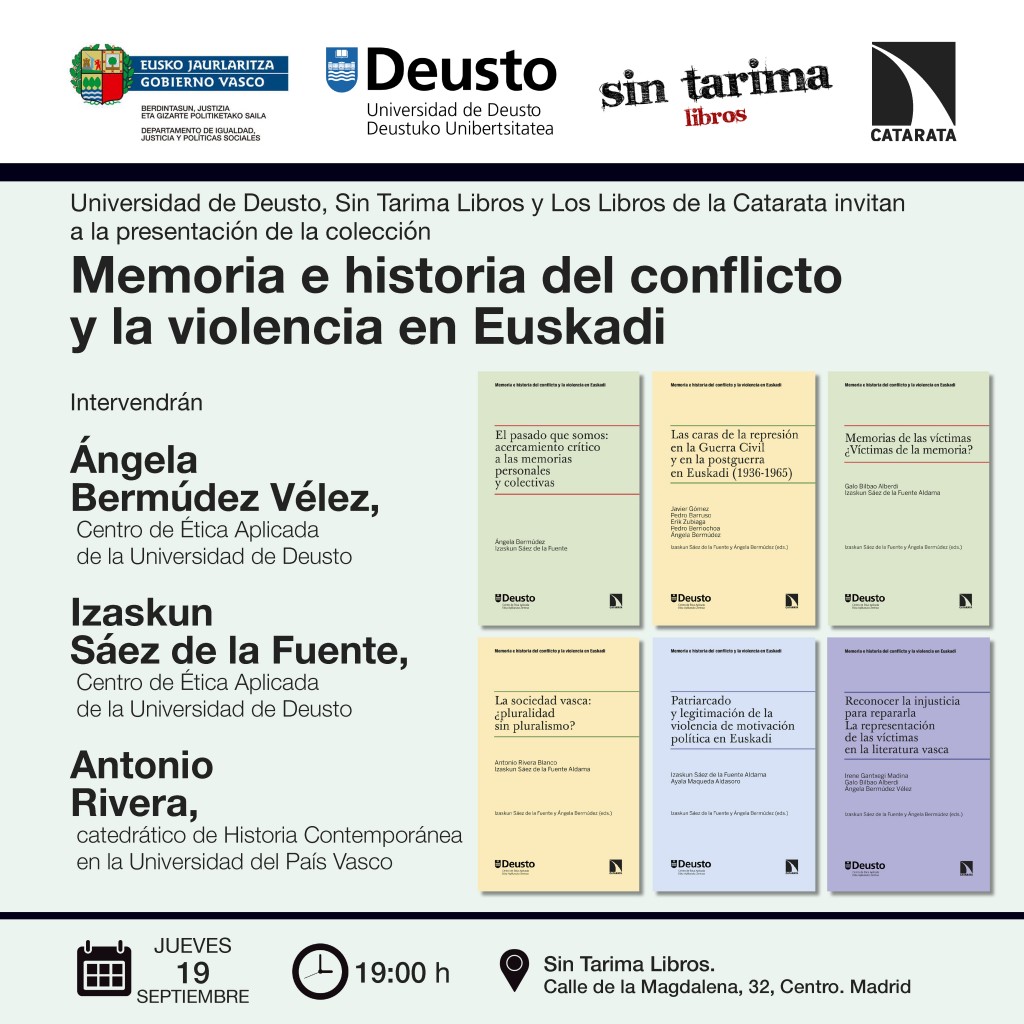EL CEA presenta en Madrid la colección editorial ‘Memoria e historia del conflicto y la violencia en Euskadi’
19/09/2024
19:00 - 20:30
Librería Sin Tarima
calle de la Magdalena, 32 centro Madrid
The University of Deusto, together with the publishing house Los Libros de la Catarata, presents next Thursday 19 September, in Madrid, a collection of 20 books on the ‘Memory and history of the conflict and violence in the Basque Country’ that aims to help university students to understand and critically comprehend the violent past experienced in the Basque Country. These publications are the result of a ‘Learning Community’ with young people developed by the Deusto Centre for Applied Ethics during the 2019-20 academic year to offer a space for dialogue and reflection on what happened in the Basque Country and how we want this history to be taught to new generations.
The starting point was the realisation that there is a persistent tendency to legitimise and/or normalise violence in many of the historical narratives that circulate socially through school texts, the media, television series, films, works of literature, and other channels of public history. And the initiative sought to advance the idea that good history education, oriented towards the development of people's critical thinking and historical awareness, can contribute to the denormalisation and delegitimisation of violence, and thus to peacebuilding.
In this sense, the monographic books address different historical and/or ethical questions that are fundamental for a critical understanding of the Basque Country's violent past. Each of them focuses on one of the ‘myths’ from which the use of violence has been ‘explained’ and justified, and in contrast, proposes other narratives, explanations and documentary sources that invite readers to reflect critically on their memory. Each volume includes the material in Spanish and Basque.
At the presentation, which will take place, at 7pm, at the Sin Tarima Libros bookshop in Madrid (Calle de la Magdalena, 32 centro), the project leaders Ángela Bermúdez and Izaskun Sáez de la Fuente, from the Centre for Applied Ethics (CEA) at the University of Deusto, will take part, as well as the Professor of Contemporary History at the University of the Basque Country, Antonio Rivera.
Books published to date:
- The past we are: a critical approach to personal and collective memories (Ángela Bermúdez and Izaskun Sáez de la Fuente).
- The faces of repression in the Civil War and the post-war period in the Basque Country (1936-1965) (Javier Gómez, Pedro Barruso, Erik Zubiaga, Pedro Berriochoa, Ángela Bermúdez).
- Memories of the victims, victims of memory? (Galo Bilbao and Izaskun Sáez de la Fuente).
- Basque society: plurality without pluralism? (Antonio Rivera and Izaskun Sáez de la Fuente).- Patriarchy and legitimisation of politically motivated violence in the Basque Country (Izaskun Sáez de la Fuente and Ayala Maqueda).- Recognising injustice in order to repair it. The representation of victims in Basque literature (Irene Gantxegi and Galo Bilbao).
These books are mainly aimed at young people and ordinary citizens interested in issues related to the Basque violent past, but also at teachers in practice or in training and people from different public and private organisations who want to promote respect for human rights and the cultivation of peace and coexistence.





